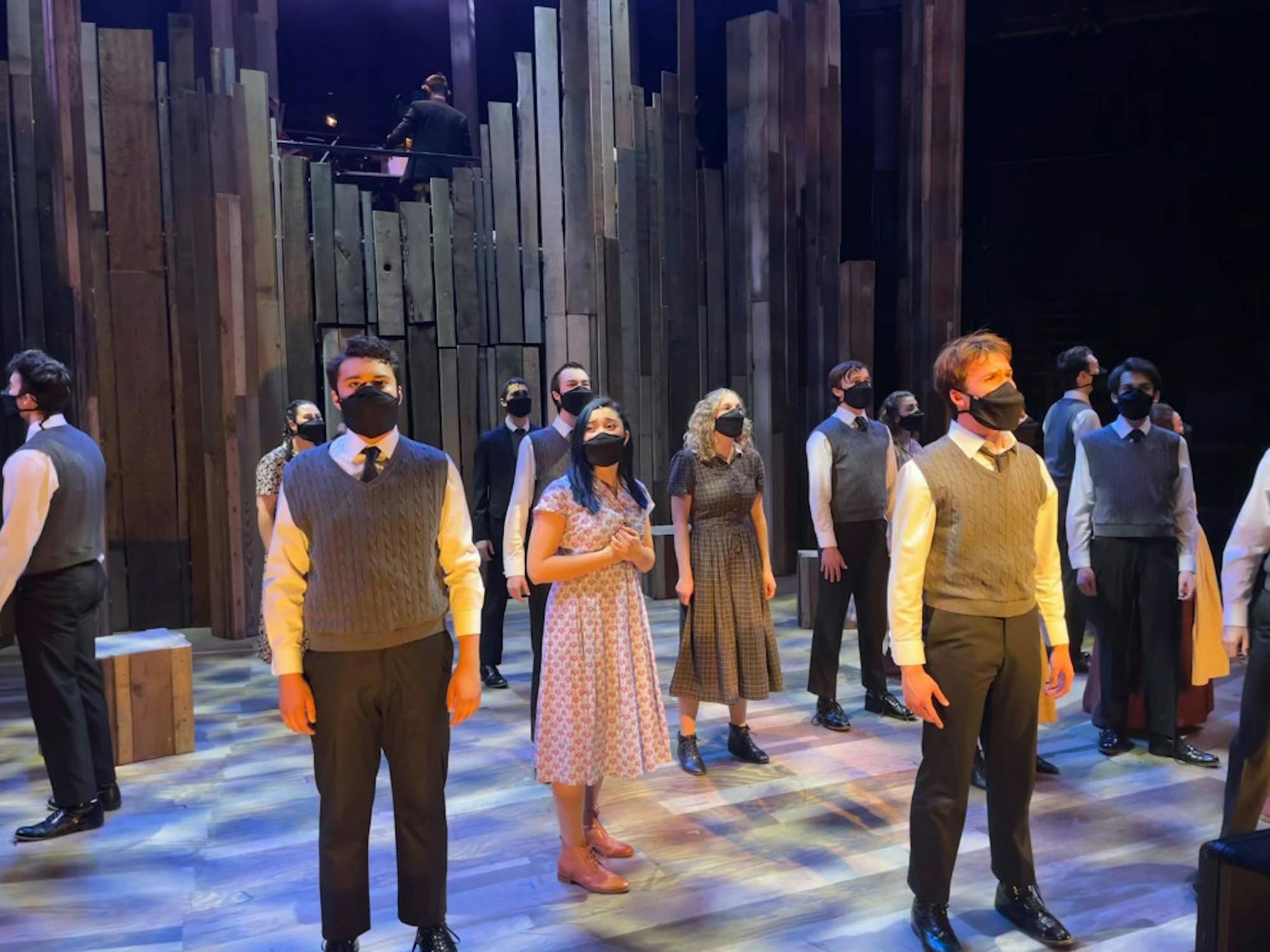Content warning: this article mentions abuse, sexual assault, abortion and suicide.
Following the acclaimed fall 2021 production of Harrison Clark and Ben Mizrach’s“Almanac," the Department of Theatre, Dance, and Performance Studies continues its in-person musical theater reawakening this spring with an aptly named choice: Steven Sater and Duncan Sheik’s 2006 musical, “Spring Awakening." The Tony Award-winning show, which is based on Frank Wedekind’s 1891 play "Spring's Awakening," tells the tumultuous tale of several sexually repressed teenagers living in Wedekind’s Germany.Sater’s script draws heavily from Wedekind’s oeuvre, and paired with Sheik’s vivacious score of alternative rock music, “Spring Awakening” has the potential to be a boldly exhilarating production during its run at Tufts March 3–13.
Adolescence is fraught for the children of “Spring Awakening,” each of whom is embarking on their own journey towards self-discovery and intellectual and sexual awakening within a society where inquiry and curiosity are met with dishonesty and abuse. As is sung in one of the most anticipated musical numbers of the show “Totally F---ed,” “you’re f---ed if you speak your mind.” For these characters, being “f---ed” may mean experiencing mental illness, being victims of child abuse or having “no way to handle things who make [them] so sad.” Through riotous song and dance breaks, the audience is afforded a look into the tribulations of Wedekind’s teenagers who want nothing more to be free from the repression and tyranny of their world.
“Through song and dance, they expressed their innermost thoughts and turbulent emotions, finding temporary release from a repressive society that claims to love them, fails to understand them, and nearly destroys them,” Professor of Theatre, Dance, and Performance Studies Barbara Wallace Grossman, the show’s director, wrote in her prologue essay on the show.
Grossman expanded upon her essay in an interview with the Daily.
“[Spring Awakening] is really about young people struggling against a world of repression and tyranny,trying to experience the world through their bodies, through their senses [and] through what they know,” Grossman said.
Emma Downs, a senior playing female lead Wendla Bergmann spoke to the complexity of playing a character living in Wedekind’s world.
“[Wendla] has been really challenging for me because she is going through not only explorations and curiosity about her sexual desires, [but] she's also having to deal with the repercussions of exploring these desires in a world that doesn't teach her about them,” Downs said.
Wendla’s storyline is one that exposes the devastating consequences of parental dishonesty, and that ends in the ultimate tragedy after she experiences an unwanted pregnancy and an unsafe abortion. While this all may seem reminiscent of the “totally f---ed” world of the play, Grossman identified a key parallel between Wedekind’s society and our own.
“What makes [‘Spring Awakening’] speak to me today is the threat to Roe v. Wade, which is very real,” Grossman said. “I think that the fact that we are debating abortion rights and abortion access now makes the play feel even more relevant to me than it did when I initially saw it in 2007.”
Deck Manager Lindsay Diab, a sophomore, added that she sees the topic of men’s mental health to be central to the show, and cited the character Moritz, who struggles with his mental health and eventually ends his own life, as an important figure of men’s mental health awareness.
“I think Moritz represents a great perspective on men's mental health and how that is an issue that needs to be tackled,” Diab said.“It’s not going to be saved by one show, but if people can even just start thinking about it, I think that would be helpful coming away from the show.”
Intimacy and violence abound in “Spring Awakening,” and as a means to keep actors safe during these scenes, the department began working with Intimacy Choreographer Margaret Clark.
“We've had the blessing of working with an intimacy choreographer, who is someone whose role it is to make sure the space is safe where there are scenes of intimacy and violence, and to choreograph exactly what's happening so everyone in the space feels that they're safe and they know what's going on,” Downs said.
Intimacy choreography, a relatively new subfield within performance, is meticulous work done between a professional such as Clark and the actors to ensure that there are no surprises during these complicated scenes. According to Grossman, masks further complicated intimacy work, as some actions which convey intimacy are not able to be performed convincingly while masked.
“We had to find other ways of expressing affection and physical intimacy, you know, with caressing, embracing movements that could tell the story in a way that would look credible that the actors were comfortable with, but would also tell the story,” Grossman said.
The intensity and potentially triggering nature of many of this show’s themes also prompted Grossman to work to promote audience safety during and after the production. Alongside Tufts Counseling and Mental Health Service and Tufts Action for Sexual Assault Prevention, Grossman developed a list of confidential resources available to students that audience members can access via QR code at performances of “Spring Awakening.”
“I feel that we are doing what we must in order to ensure, to the extent that we can, people's emotional and psychological safety,” Grossman said.
According to Downs and Grossman, audience safety also includes being prepared for the range of emotion this production is likely to evoke.
“This show will make you truly feel and experience some powerful emotions,” Downs wrote in an electronic message to the Daily. “The show can be quite beautiful and fun and thoughtful but also serious and tragic.”
“Spring Awakening” in all its beauty, thoughtfulness and tragedy will be performed in the Balch Arena Theater on March 4, 5, 11, 12 and 13, with a public preview on March 3. March 11 and 13 will be open caption performances. Tickets for all performances can be purchased throughTufts Tickets.






